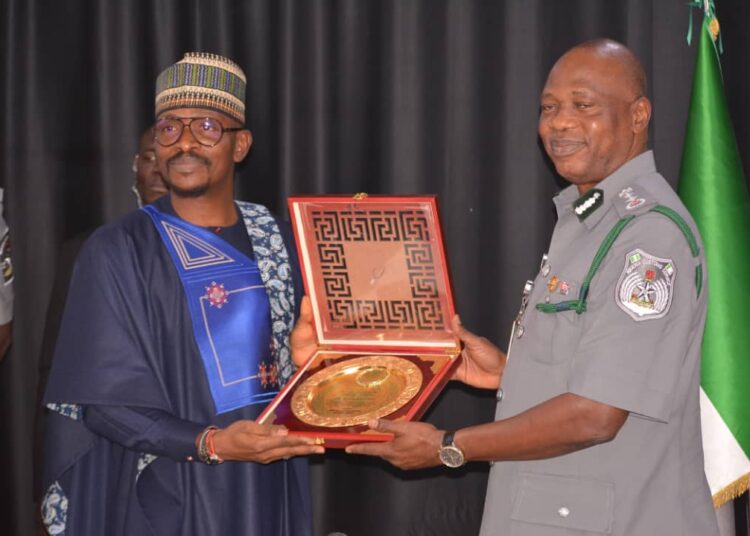The UN-Habitat Ambassador to Nigerian, His Excellency Dr. Raymond Edoh has stated that no fewer than ten thousand Nigerian youths would be mobilized to commence a nationwide campaign against smuggling which is aimed at sanitizing the Nigerian goods and services market for the safety of Nigerian lives and property and to henceforth put to an end smuggling, across the federation.
“Statistically speaking, 99.9% of perpetrators of smuggling activities are carried out by the youths and as such, the best measure is to use the youth constituency to conscientise others via an eye opening campaigns.
“Alot of Customs Officers have lost their lives in the course of fighting smuggling, and the civilians also have lost their lives in the course of consuming smuggled products, and this simply means, if it is allowed to continue, the country would be in a serious mess in the nearest future. That’s why we can’t ford our arms any longer and watch smuggling eat the future of this nation”.
The UN-Habitat Ambassador to Nigeria made this known on Tuesday at the Nigerian Customs Service headquarters in Abuja during a courtesy visit to the Comptroller General of the Nigerian Customs Service.
While speaking, Dr. Raymond has this to say, “Smuggling can have various negative effects on a nation, both economically and socially. Here are some of the key impacts of smuggling:
“Economic Losses: Smuggling undermines legitimate trade and tax revenues. It leads to a loss of government revenue as smuggled goods bypass customs duties, sales taxes, and other tariffs. This reduces the funds available for public services, infrastructure development, and social welfare programs.
“Unfair Competition: Smuggling creates an uneven playing field for legitimate businesses. Smuggled goods are often sold at lower prices since they avoid taxes and import duties. This puts legal businesses at a disadvantage, leading to reduced profitability, job losses, and sometimes business closures.
“It also leads to Distorted Markets: Smuggling disrupts domestic markets by flooding them with illicit products. This can result in price fluctuations, reduced quality control, and unfair market competition. Legal producers and manufacturers may find it difficult to survive in such an environment, affecting the overall health of the economy.
“Organized Crime and Corruption: Smuggling is often associated with organized criminal networks. These networks engage in various illegal activities, including drug trafficking, human trafficking, arms smuggling, and counterfeit goods. The presence of organized crime undermines social stability, erodes public trust in institutions, and fosters corruption within law enforcement agencies.
” Loss of Intellectual Property: Smuggling frequently involves the trafficking of counterfeit and pirated goods. This leads to significant losses for industries that rely on intellectual property rights, such as entertainment, technology, and luxury goods. Counterfeit products not only harm the legitimate market but can also pose risks to consumer health and safety.
“Security Concerns: Smuggling can be a conduit for illicit trade in weapons, drugs, and other contraband, which can have severe security implications. It can facilitate the financing of terrorism, contribute to the proliferation of illegal firearms, and undermine public safety.
“Environmental Impact: Certain smuggled goods, such as wildlife products, hazardous materials, or illegal waste disposal, can have detrimental effects on the environment. Smuggling can contribute to deforestation, wildlife depletion, pollution, and ecological imbalances in the larger picture.
While unveiling a Roll up banner with inscriptions, “National War Against Smuggling, Help Customs Officers End Smuggling Today, Stop Smuggling Today,” and Flags distributed to attendees with the inscription, “Say No to Smuggling”, Edoh said,
the way forward remains that efforts to combat smuggling require strong law enforcement, international cooperation, and targeted policies. By addressing smuggling activities, nations can protect their economies, promote fair trade, enhance public safety, and safeguard the well-being of their citizens.
Proffering solutions, he said, “Curbing smuggling nationwide requires a comprehensive approach that involves various stakeholders, including government agencies, law enforcement authorities, and international cooperation. Here are some effective strategies to combat smuggling:
“Strengthen Border Controls: Enhance border security measures by investing in technology, infrastructure, and personnel training. Implement advanced scanning systems, surveillance technologies, and intelligence-sharing mechanisms to detect and intercept smuggled goods.
“Improve Customs Enforcement: Enhance the capacity and training of customs officials to effectively identify and seize smuggled goods. Implement risk assessment techniques, data analytics, and profiling methods to target high-risk shipments and individuals involved in smuggling activities.
“Strengthen Legal Frameworks: Review and update existing laws and regulations related to smuggling, including customs, trade, intellectual property, and anti-money laundering legislation. Ensure that penalties for smuggling offenses are sufficiently stringent to deter potential smugglers.
” International Cooperation: Foster bilateral and multilateral cooperation with neighboring countries and international organizations to combat cross-border smuggling. Share intelligence, coordinate operations, and exchange best practices to enhance enforcement efforts.
“Public Awareness and Education: Launch public awareness campaigns to educate citizens about the negative impacts of smuggling. Promote responsible consumer behavior and discourage the purchase of counterfeit goods. Encourage citizens to report suspicious activities and provide channels for anonymous reporting.
“Strengthen Law Enforcement Collaboration: Improve coordination and information sharing among relevant law enforcement agencies, such as customs, police, immigration, and financial intelligence units. Establish specialized task forces or joint operations to target organized smuggling networks.
” Strengthen Anti-Corruption Measures: Combat corruption within law enforcement agencies by implementing transparent recruitment processes, promoting accountability, and providing adequate training and resources. Establish mechanisms for reporting and investigating corruption allegations.
“Engage the Private Sector: Work closely with businesses, industry associations, and intellectual property rights holders to raise awareness and collaborate in the fight against smuggling. Encourage the implementation of supply chain security measures and the use of authentication technologies to prevent counterfeiting.
“Strengthen International Trade Agreements: Include provisions in trade agreements that address smuggling and the protection of intellectual property rights. Facilitate information sharing and cooperation between nations to combat transnational smuggling networks.
“Enhance Penalties and Prosecution: Ensure that smugglers face significant legal consequences for their actions. Strengthen prosecution efforts, establish specialized courts or dedicated units to handle smuggling cases, and provide adequate resources to support investigations and court proceedings.
“Making capacity building of the Customs officers a greater priority.
“By implementing these strategies in a coordinated and sustained manner, Nigeria can significantly reduce smuggling activities, protect their economies, and promote fair trade while enhancing security and public safety.
Earlier, while speaking on the UN-Habitat and it’s mandate, His Excellency, Dr. Raymond Edoh disclosed that UN-Habitat, is the United Nations agency for human settlements. It is mandated by the UN General Assembly to promote socially and environmentally sustainable towns and cities with the goal of providing adequate shelter for all. The main documents outlining the mandate of the organisation are the Vancouver Declaration on Human Settlements, Habitat Agenda, Istanbul Declaration on Human Settlements, the Declaration on Cities and Other Human Settlements in the New Millennium, and Resolution 56/206.
“The United Nations Millennium Declaration recognises the dire circumstances of the world’s urban poor. It articulates the commitment of Member States to improve the lives of at least 100 million slum dwellers by the year 2020 – Target 11 of Goal No.7 – a task mandated to UN-Habitat.
“As large as 100 million may seem, however, it is only 10 per cent of the present worldwide slum population, which, if left unchecked, will multiply threefold to 3 billion by the year 2050. The challenge is made more daunting by the fact that, according to UN-Habitat’s own research, the world’s slum population has already grown by 75 million in barely three years since the Millennium Declaration.
“As our towns and cities grow at unprecedented rates setting the social, political, cultural and environmental trends of the world, sustainable urbanisation is one of the most pressing challenges facing the global community in the 21st century. In 1950, one-third of the world’s people lived in cities. Just 50 years later, this proportion has risen to one-half and will continue to grow to two-thirds, or 6 billion people, by 2050. Cities are now home to half of humankind. They are the hub for much national production and consumption – economic and social processes that generate wealth and opportunity. But they also create disease, crime, pollution and poverty. In many cities, especially in developing countries, slum dwellers number more than 50 per cent of the population and have little or no access to shelter, water, and sanitation. This is where UN-Habitat is mandated to make a difference for the better.”
Also speaking at the event, Dr. Samson Adeosun, the CEO of ASQ, pointed out that its UK-based company would be training the Nigerian Customs Service Officers for free with a UK-based certification aftermath the training.
He reiterated that it is a way of giving back to the Nigerian government as he assures Customs of an efficient and effective UK-based border control standard kind of operation after the training of their officers.
Reacting to the statements, the Comptroller General of the Nigerian Customs Service, Adewale Adeniyi applauded the UN-Habitat Ambassador to Nigeria, Dr. Raymond Edoh for extending a hand of partnership to the Nigerian Customs Service.
“On behalf of the Nigerian Customs Service, we welcome you to the Service Headquarters. The Ambassador has raised very important issues here.
“In as much as we are doing our best in the fight against smuggling, there is a need for Nigeria to start producing as invariably, it will reduce smuggling and strengthen the Naira. In a situation where a country depends on importation and nothing is exported, the currency of the economy will suffer devaluation and with the same kind of one-sided economy of importation, the country tends to be under a high risk of smuggling.
“Recently, in a bid to strengthen our officers in the fight against smuggling, we have trained six officers on ICT. This would help in all areas including Border Control. They just return to the country not long”.
Speaking further, he assured the UN-Habitat delegation of Customs’ total support using the Youth Constituency to fight Smuggling in Nigeria as well as the training of Customs officers as he delegated the Deputy Controller General, Enforcement and Drugs and Administration, Abba Kura to closely work with them to achieve the desired result.
The highlight of the event was the exchange of plaques, group photographs, and the presentation of a customized T-shirt and Face cap by the UN-Habitat Ambassador to Nigeria, H. E., Dr. Edoh.





